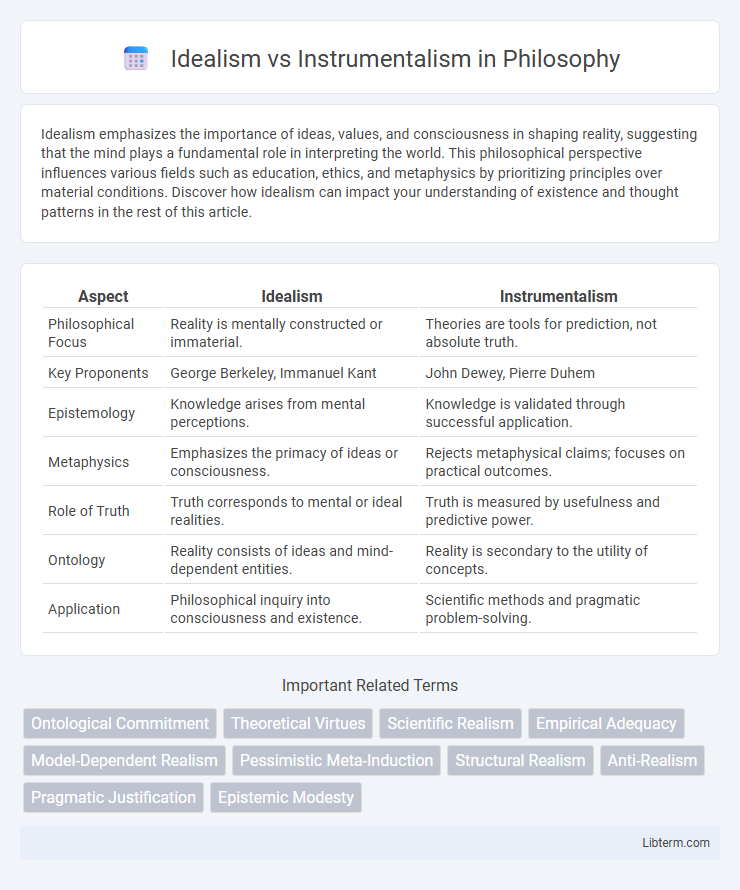Idealism emphasizes the importance of ideas, values, and consciousness in shaping reality, suggesting that the mind plays a fundamental role in interpreting the world. This philosophical perspective influences various fields such as education, ethics, and metaphysics by prioritizing principles over material conditions. Discover how idealism can impact your understanding of existence and thought patterns in the rest of this article.
Table of Comparison
| Aspect | Idealism | Instrumentalism |
|---|---|---|
| Philosophical Focus | Reality is mentally constructed or immaterial. | Theories are tools for prediction, not absolute truth. |
| Key Proponents | George Berkeley, Immanuel Kant | John Dewey, Pierre Duhem |
| Epistemology | Knowledge arises from mental perceptions. | Knowledge is validated through successful application. |
| Metaphysics | Emphasizes the primacy of ideas or consciousness. | Rejects metaphysical claims; focuses on practical outcomes. |
| Role of Truth | Truth corresponds to mental or ideal realities. | Truth is measured by usefulness and predictive power. |
| Ontology | Reality consists of ideas and mind-dependent entities. | Reality is secondary to the utility of concepts. |
| Application | Philosophical inquiry into consciousness and existence. | Scientific methods and pragmatic problem-solving. |
Defining Idealism and Instrumentalism
Idealism defines reality as fundamentally mental or immaterial, asserting that ideas, consciousness, or perception shape the nature of existence. Instrumentalism, in contrast, treats theories and concepts as practical tools for predicting phenomena rather than accurate depictions of an objective reality. Both philosophies address the function and interpretation of knowledge but diverge on whether abstract entities possess independent existence or serve merely as instruments for understanding.
Historical Origins of Both Philosophies
Idealism emerged from early Platonic metaphysics, emphasizing that reality is fundamentally constructed by the mind or ideas, with roots in German Idealism through philosophers like Kant and Hegel. Instrumentalism developed as an epistemological response in the late 19th and early 20th centuries, notably advanced by American pragmatists such as Charles Sanders Peirce and John Dewey, focusing on the practical utility of concepts rather than their absolute truth. These historical origins highlight idealism's metaphysical focus contrasted with instrumentalism's emphasis on the functional application of knowledge.
Key Principles of Idealism
Idealism centers on the belief that reality is fundamentally shaped by the mind, emphasizing ideas and consciousness as primary components of existence. Central to idealism is the principle that material objects do not possess independent reality apart from perception, suggesting that knowledge is inherently tied to mental constructs. Philosophers such as George Berkeley and Immanuel Kant underscored the notion that understanding the world requires grasping the underlying ideas rather than merely observing sensory phenomena.
Core Tenets of Instrumentalism
Instrumentalism views scientific theories primarily as tools for predicting observable phenomena rather than as true descriptions of an objective reality. It emphasizes the practical application and empirical success of theories without asserting their literal truth, focusing on their usefulness in solving problems. This core tenet rejects metaphysical commitments, valuing theories based on predictive accuracy and operational effectiveness.
Major Thinkers and Influencers
Major thinkers in idealism include George Berkeley, who argued that reality is fundamentally mental and dependent on perception, and Immanuel Kant, who posited that knowledge is shaped by innate structures of the mind. Instrumentalism, prominently advanced by John Dewey and Clarence Irving Lewis, emphasizes theories as tools for prediction and problem-solving without necessarily reflecting objective reality. These contrasting philosophies have significantly influenced epistemology and the philosophy of science by framing how knowledge and truth are understood and applied.
Idealism vs Instrumentalism: Main Differences
Idealism posits that reality is fundamentally shaped by the mind or ideas, emphasizing that objects and phenomena exist primarily through perception or mental constructs. Instrumentalism, in contrast, views theories and concepts as tools or instruments for predicting and explaining experiences, without asserting their inherent truth or existence. The main difference lies in idealism's belief in the ontological status of ideas versus instrumentalism's pragmatic focus on utility and predictive success.
Applications in Science and Education
Idealism in science education emphasizes the development of conceptual understanding and the pursuit of universal truths, encouraging learners to explore abstract principles and theoretical frameworks. Instrumentalism, on the other hand, prioritizes practical applications and the utility of scientific theories as tools for predicting and controlling phenomena without necessarily asserting their absolute truth. This distinction influences teaching methods, with idealism fostering critical thinking and deep conceptual engagement, while instrumentalism supports hands-on experiments and problem-solving skills aimed at real-world effectiveness.
Advantages and Criticisms of Idealism
Idealism emphasizes the primacy of ideas and consciousness, fostering creativity, ethical values, and a deeper understanding of reality beyond mere sensory experience. Critics argue that Idealism can be overly abstract, detaching knowledge from empirical evidence and practical application, making it less effective in scientific contexts. Despite this, Idealism remains influential in fields like philosophy, literature, and ethics by promoting holistic and value-driven perspectives.
Strengths and Limitations of Instrumentalism
Instrumentalism excels in its practical approach, prioritizing the predictive and explanatory power of scientific theories without requiring them to be true representations of reality. This strength allows scientists to use models and hypotheses as effective tools for problem-solving and technological advancements. However, its limitation lies in potentially neglecting the pursuit of deeper understanding, as it may discourage efforts to uncover the true nature of phenomena beyond observable predictions.
Contemporary Relevance and Future Perspectives
Idealism, emphasizing reality shaped by ideas and consciousness, continues to influence ethical frameworks and cognitive sciences, highlighting the importance of subjective experience in shaping knowledge. Instrumentalism, prioritizing practical outcomes and predictive success of theories over literal truth, remains central in scientific methodologies and technological innovation, driving advancements through adaptable models. Future perspectives suggest a convergence where idealism informs the interpretation of data within instrumentalist approaches, fostering interdisciplinary research that balances abstract principles with empirical efficacy.
Idealism Infographic

 libterm.com
libterm.com